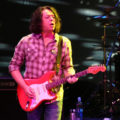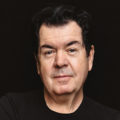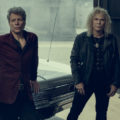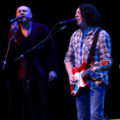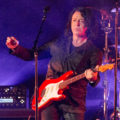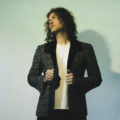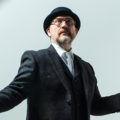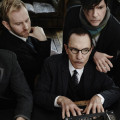Curt Smith reveals how Tinley Park-prepping Tears For Fears reached “The Tipping Point”
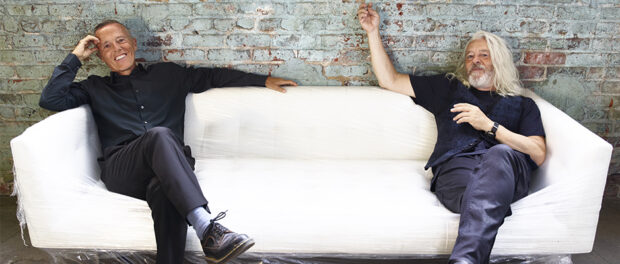 Photos provided by Frank Ockenfels
Photos provided by Frank Ockenfels
Given the constant presence of synth-pop and alternative architects Tears For Fears, either with the ageless singles “Shout,” “Everybody Wants To Rule The World,” “Head Over Heels,” “Sowing The Seeds Of Love” and “Mad World” in regular rotation, or Roland Orzabal and Curt Smith staying active on the road ever since reuniting in the early 2000s, it probably doesn’t feel like it’s been about 18 years since their last actual album.
However, other than a remasters campaign, a covers EP and a few fresh tracks for various collections, “The Tipping Point” is indeed that long overdue for the English super duo following a series of events that ranged from the deeply personal to purely artistic.
With Tears For Fears bringing bits of it all to the Hollywood Casino Amphitheatre in Tinley Park on Thursday, June 16, co-founding singer, songwriter and bassist Smith rang Chicago Concert Reviews to further reveal the reasons behind the delay, peel back the lyrical layers of the topically-charged collection and theorize how the pair’s managed to stay relevant, even attracting the regular praises of the indie rock and hip-hop communities.
What accounted for such a lengthy gap between full albums?
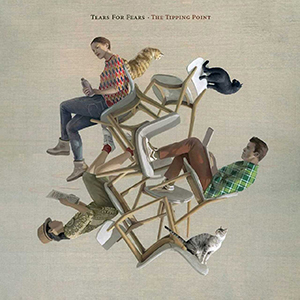 Curt Smith: Primarily after making “Everybody Loves A Happy Ending,” we were really more concerned about bringing our children up. Both of us had young children at that point in time and we’ve always been very conscious about not wanting to be absent fathers, both having grown up with absent fathers. So the touring for us each year, which lasted a couple of months and was normally in the summer, was an easy way to basically keep our hand in, keep earning money and still spend all our time with our children like we needed to.
Curt Smith: Primarily after making “Everybody Loves A Happy Ending,” we were really more concerned about bringing our children up. Both of us had young children at that point in time and we’ve always been very conscious about not wanting to be absent fathers, both having grown up with absent fathers. So the touring for us each year, which lasted a couple of months and was normally in the summer, was an easy way to basically keep our hand in, keep earning money and still spend all our time with our children like we needed to.
It wasn’t until six or seven years ago until we really got to the point where we felt for us to continue, we really needed new material. It was getting a little tedious and also our children were older, so we set about thinking about making another record. We signed to a record label and a management company. They encouraged us to go write and record with modern songwriters/producers, which we did over the period of a few years while we were touring still and we ended up with this album. There were 12 tracks on the album. We probably recorded about 20, which we just didn’t particularly like.
We felt it was a little dishonest. It was sort of 12 attempts at a modern hit sound and no album feel to us. We didn’t feel it was representative of us. So at that point in time, which was three or four years ago, we bought that album from the record label so that they wouldn’t release it. A couple years after that, we left our management company also and we were left just the two of us. So the two of us sat down and decided the path forward ourselves, without any outside input, and that’s where this album really started, even though we actually had five of the songs. The songs, not the recordings, were from previous writing sessions. We just felt the songs were really good and the lyrical content fit in with how we perceived the album to be…
I think it’s the most balanced piece of work we’ve done since our first album in the sense that’s its very finely balanced between the two of us, as was “The Hurting,” and I don’t think I’d change anything about “The Hurting.” I certainly wouldn’t change anything about this album. There are bits of “Songs From The Big Chair” and certainly “The Seeds Of Love” that I would change now, but that’s only in retrospect. So in that sense, I think it’s the most probably the most complete album we’ve done.
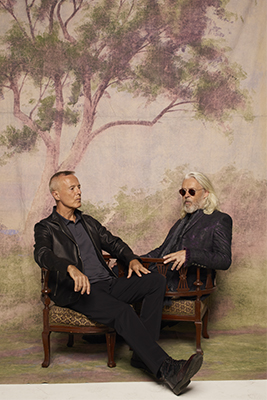 How would you describe the Tears For Fears sound at this point?
How would you describe the Tears For Fears sound at this point?
Smith: Well, it’s really hard to say. Does it sound modern? I don’t really know. People say that it does, even though it still sounds exactly like us. It’s very hard to do anything that doesn’t sound like us and I think that comes from having two singers with very distinctive voices. And when I say “distinctive,” I mean if you hear that person sing, you know it’s that person, so we have that…But a lot of people say it does sound sort of like a modern version of us and I think that probably comes from the fact that we have access to every sample, the instrumentation and all the keyboard sounds that everyone else has access to. Everything’s at your fingertips these days. You don’t really need a full-blown studio. The sounds of every record you hear on Spotify or on the radio are probably on my laptop.
Can you dive a bit into the meaning behind “The Tipping Point” title?
Smith: The meaning is two-fold, and when I say that, I mean the [entire album and the] track itself, which is about the tipping point between life and death. It’s very much about Roland’s wife passing away, so sort of about [asking several questions]. “When have they gone? Do you know when they’ve gone? Have they gone before they died? Do they go when they die? Or do they ever go?” So that’s what “The Tipping Point,” the song, is about.
There were so many things we have been through over the period of the past five, six years during the course of this album, and when I say “we,” I mean worldwide. There’s the rise of the right wing worldwide, Donald Trump in America, the Black Lives Matter movement, the MeToo movement, the climate crisis and then the pandemic came on top of all that. We touch upon all these subjects on the album and we felt “The Tipping Point” was basically our world view right now. We are at a tipping point. There is no middle anymore it seems. There’s just extreme left and extreme right, and that desire to have a middle, and to stop the tipping one way or the other. So “The Tipping Point” seemed an apt title for the whole album because we did touch on all those subjects.
You’re about to embark on an enormous tour in support of the project. What made you want to get back out to amphitheaters?
Smith: The summer is an ideal time to do it. We also felt that because of the pandemic and because of people’s wariness to be in confined spaces anymore that amphitheaters were the way to go because outdoors is not as dangerous, that’s for sure, and playing outdoors in the summer is wonderful. It’s a great feeling. I love outdoor shows when you can actually have air in your face and you’re not in an enclosed space, so the reasons were two fold, but the outdoor shows are something we do enjoy.
How did you get connected with Garbage for your support act?
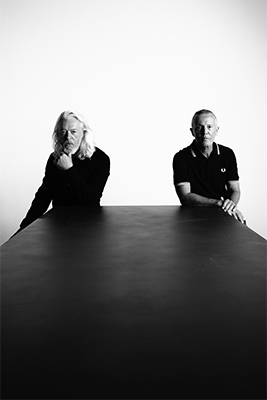 Smith: Garbage were suggested to us. The first thing we didn’t want to do was pick anyone from the era when we started because then you’re just going to get labeled as an “‘80s tour,” and every time we’ve been offered an “‘80s tour,” we’ve turned it down because we don’t feel like we can be tied to a decade. I don’t think anyone should be tied to a decade, especially if you’re still making music and have continued to make music past that decade. We’ve made music in the ‘90s, we made music in the 2000s and we ended up making music in the 2010s, even though it’s not coming out until now, so we didn’t want to be tied to an era and Garbage are an amazing live band. I’ve met [singer/guitarist] Shirley [Manson] and I’ve met [multi-instrumentalist] Butch [Vig]. They are great people, so it will be a good package.
Smith: Garbage were suggested to us. The first thing we didn’t want to do was pick anyone from the era when we started because then you’re just going to get labeled as an “‘80s tour,” and every time we’ve been offered an “‘80s tour,” we’ve turned it down because we don’t feel like we can be tied to a decade. I don’t think anyone should be tied to a decade, especially if you’re still making music and have continued to make music past that decade. We’ve made music in the ‘90s, we made music in the 2000s and we ended up making music in the 2010s, even though it’s not coming out until now, so we didn’t want to be tied to an era and Garbage are an amazing live band. I’ve met [singer/guitarist] Shirley [Manson] and I’ve met [multi-instrumentalist] Butch [Vig]. They are great people, so it will be a good package.
Any memories of performing around Chicago?
Smith: A lot of the time touring can be a blur. What I most remember about watching shows in Chicago wouldn’t be our own show. It would be going to Lollapalooza, which I took my children to. I love Chicago. It’s a great place. It’s a wonderful city, so we’re looking forward to coming back, and if I remember rightly, the audience are pretty crazy as well, so this should be fun.
Leading up to “The Tipping Point,” each of your classic albums were remastered and expanded. What additional perspective did that bring to the material?
Smith: The prime ones that brought additional perspective were the surround sound [mixes]. Obviously in surround sound, things have a lot more space and a lot more room to breathe, so remastering in surround is a wonderful thing because you can pick out little intricate parts of production that maybe in stereo you wouldn’t hear as clearly. The [Dolby] Atmos mixes certainly do that even more because sounds can be above you, as well as behind you. The surround sound versions, the Atmos versions are a joy to listen to. They do definitely put a different perspective on the production.
How has Tears For Fears managed to maintain such a timelessness, even when it comes to older classics such as “Shout” and “Everybody Wants To Rule The World?”
Smith: My opinion is if you make music with depth and meaning, that depth and meaning will continue to be valid. I find it slightly unfortunate, but fortunate for us as far as being musicians go, that “Mad World,” “Everybody Wants To Rule The World” and “Sowing The Seeds Of Love” still resonate today because things haven’t changed that much, and to a degree, have gotten worse. During the pandemic, I ended up recording, just for my wife’s boss for her social media, a version of “Mad World” with my daughter and suddenly that went viral. And then you’re like, “oh yeah, I guess that makes sense. It’s a father and daughter in lockdown singing ‘Mad World,’” so they take on a new poignancy I think.
You stepped down from the group after the initial three albums and also recorded on your own. How did you feel about Roland continuing with Tears For Fears before fully reuniting?
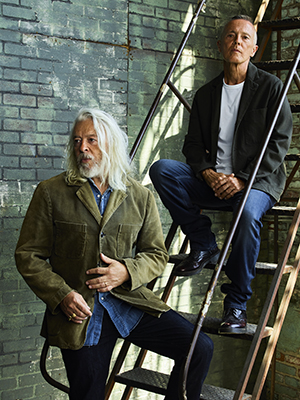 Smith: I didn’t mind. I mean, I would’ve preferred had he not, but I didn’t mind, particularly because I didn’t concern myself with it back then. My prime concern back then was leaving and trying to find myself as an individual, which is why I moved to New York and have lived in America ever since. I was more concerned with other things, so to a certain degree, it went over my head because I wasn’t really paying attention. I was really enjoying my new life in New York and loving the fact that I could disappear and no one would bother me. Even if people recognize you in New York, they don’t stop you and they don’t bother you. It’s a very different world than being in a small town in England. I was trying to find myself as an individual, so I didn’t want to be a part of a collective, that collective being Tears For Fears.
Smith: I didn’t mind. I mean, I would’ve preferred had he not, but I didn’t mind, particularly because I didn’t concern myself with it back then. My prime concern back then was leaving and trying to find myself as an individual, which is why I moved to New York and have lived in America ever since. I was more concerned with other things, so to a certain degree, it went over my head because I wasn’t really paying attention. I was really enjoying my new life in New York and loving the fact that I could disappear and no one would bother me. Even if people recognize you in New York, they don’t stop you and they don’t bother you. It’s a very different world than being in a small town in England. I was trying to find myself as an individual, so I didn’t want to be a part of a collective, that collective being Tears For Fears.
What’s your take on hip-hop and indie rock’s increasing embrace of the group with samples or covers from the likes of Kanye West, The Weeknd and Lorde?
Smith: They’re all different, or at least most of them are very different interpretations of our songs, so on that level, I find them fascinating, interesting and wonderful to listen to. If anything, say the Lorde version of “Everybody Wants To Rule The World” or the Gary Jules/Michael Andrews version of “Mad World,” the production is more in tune with the lyrics, to be honest, because the lyrics are quite dark and they made very dark recordings, so I love that. As far as sampling goes, obviously it’s very gratifying that even the hip-hop world embrace us as well. Kanye [West], The Weeknd and Drake all choose songs from “The Hurting,” which I find interesting because “The Hurting” was not our big album in America. “Songs From The Big Chair” was, but that may have something to do with [the latter] two of them being Canadian cause I think it did well in Canada.
Is there anything else that’s surprised you about Tears For Fears thus far?
Smith: I’m shocked that we’re still doing it [laughs] and going strong. Shocked and grateful I guess. I think had you asked our 20-year-old selves [if you’d] still be doing this when you’re 60, you would have heard us laugh, but we are and we’re still enjoying it, thankfully. If anything, I think that comes from the desire and the knowledge that you haven’t perfected what you do yet and I don’t think we ever will. I still listen to modern records that I think are better than our records, and until we get to that point [where] we’re better than everyone else, which we never will get to, then we’ll keep attempting to get better. When there’s room for improvement, then you carry on!
Tears For Fears performs at the Hollywood Casino Amphitheatre on Thursday, June 16. For additional details, visit TearsForFears.com and LiveNation.com.

